*/
Are barristers primed and ready to rethink, reshape and future-proof their practice? Might technology be part of the answer, especially when time is already stretched? These questions were examined in A Brave New Bar , a state-of-play report based on research conducted by LexisNexis
Despite a steady decline in the number of cases going to court, legal aid cuts, rising rents and falling fees, the majority of barristers surveyed for A Brave New Bar remain bullish regarding their practice prospects. Nearly three quarters reported their own practice as either stable or growing, compared to three years ago, and two in three believed that they would remain stable or grow in the next three to five years.
Drilling down, 67% of criminal barristers said their practice had grown or remained steady in the last three years – and 58% said they plan to remain steady or grow in the next three to five years. This compares to 78% of civil barristers who said their practice had grown or remained steady in the last three years – and 72% said they plan to remain steady or grow in the next three to five years.
Of the barristers surveyed, on average 92% of their work still comes through solicitors. On direct access, 31 out of the 404 who answered this question said that these instructions accounted for at least 50% or more of their work. Others said they were wary of moving towards direct access because they feared it would jeopardise long-standing relationships with solicitors – and that they would need to spend even more of their already scant time dealing with clients.
Traditionally, received wisdom has always been that it’s better for barristers to specialise than branch out – and the sample reflects that. Of those who said they would like to diversify, 46% said they don’t have the time or support they need to do it. In terms of the best route to a sustainable business, 26% said they thought it was developing a mixed practice and 29% said they weren’t sure. ‘I personally think specialisation is better. However, to survive, diversification is needed.’ ‘The Bar will need to focus more on international work as competition increases for a limited amount of domestic work.’ Finding time to develop business or diversify is another factor, however: ‘Court demands mean there is no time to build new areas of practice.’
One of the main barriers preventing barristers from branching out into new practice areas seems to be lack of cooperation with other barristers from the same set. To support diversification into new practice areas, there are tools that can make it easy to get a quick overview of a particular practice area, and track down the most relevant, up-to-date legislation and cases in a matter of seconds. And for those taking on more direct access work, tools like smart forms and templates can help with tasks that would normally fall to a solicitor.
‘I am a sole practitioner working from my home office when not in court. Increasingly I rely on electronic papers, online research tools, and conduct client and co-counsel meetings and hearings by phone and online. Social media and my website are likely to be important marketing/business development tools in the near future.’
When we asked barristers what support they need to help grow their practice, ‘building/improving marketing’ came out on top (57%). This is another area where technology can help, with tools designed specifically to help barristers in areas like marketing, business development and pricing – areas which many barristers don’t have the training, experience – or interest – in.
It is well documented that managing wellbeing and resilience (aka stress, work/life balance) is one of the most critical challenges for barristers. And according to anecdotal evidence, much of that stress boils down to a lack of time.Growing regulations, rising costs and falling fees all mean there’s less time for barristers to focus on advocacy. Investing in tools to automate simple tasks or speed up research time isn’t just about saving time and money, but alleviating stress, improving work satisfaction, and freeing up time to spend on the parts of the job they’re passionate about.
Nearly 30% cited delays in receiving fees in publicly funded cases in their top three most critical challenges – and roughly the same number (33%) rated delays in receiving fees in private cases in their top three: ‘It is incredible that aged debt is an accepted reality in this profession. If a builder or plumber was not paid within 28 days, it would be seen as completely unacceptable.’ ‘There is a lot of publicity given to Wellbeing at The Bar but if we all received payment within 30 days this would alleviate one of the biggest wellbeing problems.’
From new rules around data protection and money laundering, to HMRC’s ‘Making Tax Digital’ regime for VAT, around 28% of the barristers surveyed also rated increasing regulations in their top three most critical challenges. All the extra time involved in keeping up with the latest changes and dealing with the extra admin and paperwork inevitably means there’s less time to focus on clients, let alone ‘luxuries’ like business development: ‘Increased regulation makes it hard for small sets with limited resources expected to do the same as large sets with huge support teams.’
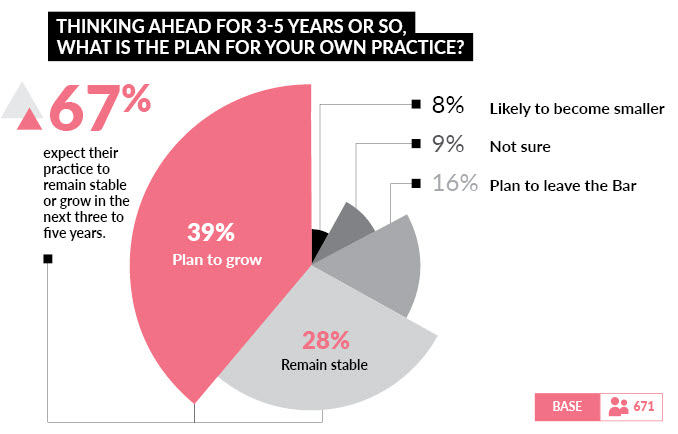
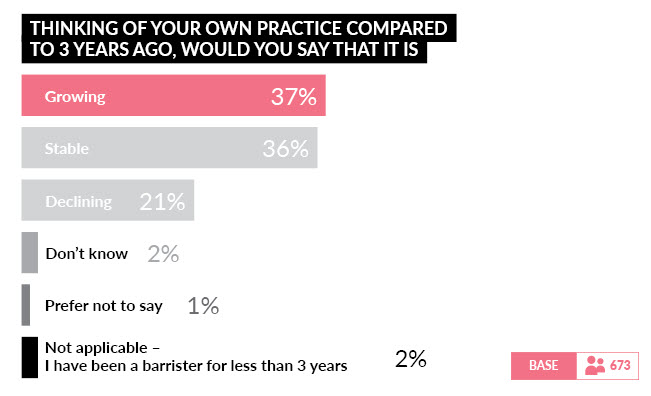
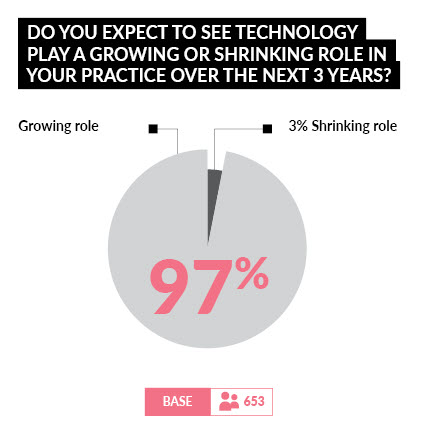
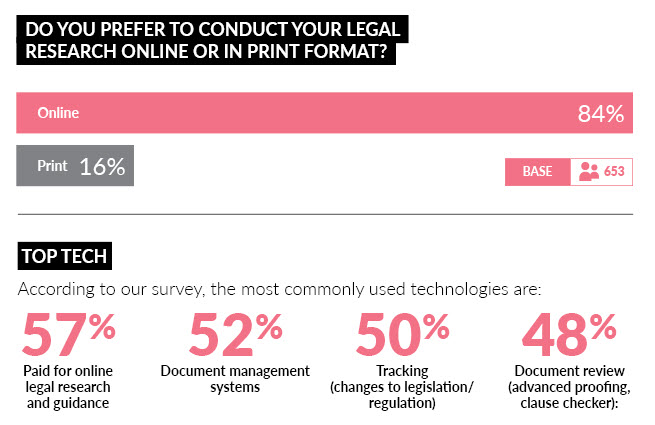
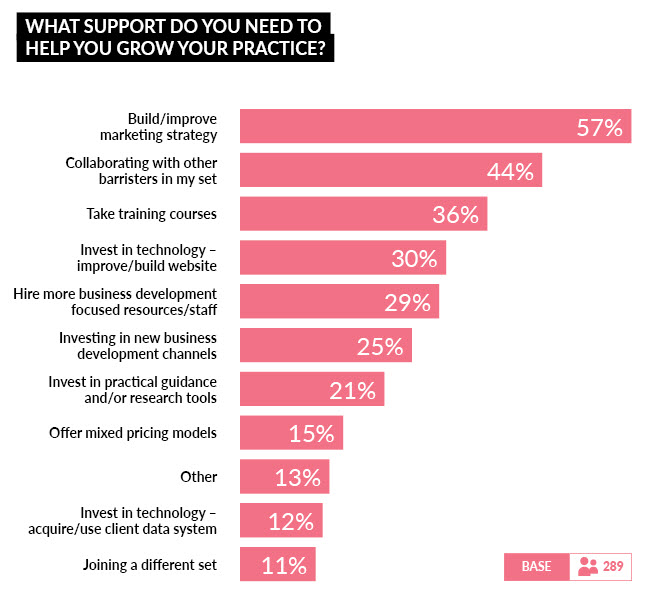
Despite a steady decline in the number of cases going to court, legal aid cuts, rising rents and falling fees, the majority of barristers surveyed for A Brave New Bar remain bullish regarding their practice prospects. Nearly three quarters reported their own practice as either stable or growing, compared to three years ago, and two in three believed that they would remain stable or grow in the next three to five years.
Drilling down, 67% of criminal barristers said their practice had grown or remained steady in the last three years – and 58% said they plan to remain steady or grow in the next three to five years. This compares to 78% of civil barristers who said their practice had grown or remained steady in the last three years – and 72% said they plan to remain steady or grow in the next three to five years.
Of the barristers surveyed, on average 92% of their work still comes through solicitors. On direct access, 31 out of the 404 who answered this question said that these instructions accounted for at least 50% or more of their work. Others said they were wary of moving towards direct access because they feared it would jeopardise long-standing relationships with solicitors – and that they would need to spend even more of their already scant time dealing with clients.
Traditionally, received wisdom has always been that it’s better for barristers to specialise than branch out – and the sample reflects that. Of those who said they would like to diversify, 46% said they don’t have the time or support they need to do it. In terms of the best route to a sustainable business, 26% said they thought it was developing a mixed practice and 29% said they weren’t sure. ‘I personally think specialisation is better. However, to survive, diversification is needed.’ ‘The Bar will need to focus more on international work as competition increases for a limited amount of domestic work.’ Finding time to develop business or diversify is another factor, however: ‘Court demands mean there is no time to build new areas of practice.’
One of the main barriers preventing barristers from branching out into new practice areas seems to be lack of cooperation with other barristers from the same set. To support diversification into new practice areas, there are tools that can make it easy to get a quick overview of a particular practice area, and track down the most relevant, up-to-date legislation and cases in a matter of seconds. And for those taking on more direct access work, tools like smart forms and templates can help with tasks that would normally fall to a solicitor.
‘I am a sole practitioner working from my home office when not in court. Increasingly I rely on electronic papers, online research tools, and conduct client and co-counsel meetings and hearings by phone and online. Social media and my website are likely to be important marketing/business development tools in the near future.’
When we asked barristers what support they need to help grow their practice, ‘building/improving marketing’ came out on top (57%). This is another area where technology can help, with tools designed specifically to help barristers in areas like marketing, business development and pricing – areas which many barristers don’t have the training, experience – or interest – in.
It is well documented that managing wellbeing and resilience (aka stress, work/life balance) is one of the most critical challenges for barristers. And according to anecdotal evidence, much of that stress boils down to a lack of time.Growing regulations, rising costs and falling fees all mean there’s less time for barristers to focus on advocacy. Investing in tools to automate simple tasks or speed up research time isn’t just about saving time and money, but alleviating stress, improving work satisfaction, and freeing up time to spend on the parts of the job they’re passionate about.
Nearly 30% cited delays in receiving fees in publicly funded cases in their top three most critical challenges – and roughly the same number (33%) rated delays in receiving fees in private cases in their top three: ‘It is incredible that aged debt is an accepted reality in this profession. If a builder or plumber was not paid within 28 days, it would be seen as completely unacceptable.’ ‘There is a lot of publicity given to Wellbeing at The Bar but if we all received payment within 30 days this would alleviate one of the biggest wellbeing problems.’
From new rules around data protection and money laundering, to HMRC’s ‘Making Tax Digital’ regime for VAT, around 28% of the barristers surveyed also rated increasing regulations in their top three most critical challenges. All the extra time involved in keeping up with the latest changes and dealing with the extra admin and paperwork inevitably means there’s less time to focus on clients, let alone ‘luxuries’ like business development: ‘Increased regulation makes it hard for small sets with limited resources expected to do the same as large sets with huge support teams.’





Are barristers primed and ready to rethink, reshape and future-proof their practice? Might technology be part of the answer, especially when time is already stretched? These questions were examined in A Brave New Bar, a state-of-play report based on research conducted by LexisNexis


Now is the time to tackle inappropriate behaviour at the Bar as well as extend our reach and collaboration with organisations and individuals at home and abroad
A comparison – Dan Monaghan, Head of DWF Chambers, invites two viewpoints
And if not, why not? asks Louise Crush of Westgate Wealth Management
Marie Law, Head of Toxicology at AlphaBiolabs, discusses the many benefits of oral fluid drug testing for child welfare and protection matters
To mark International Women’s Day, Louise Crush of Westgate Wealth Management looks at how financial planning can help bridge the gap
Casey Randall of AlphaBiolabs answers some of the most common questions regarding relationship DNA testing for court
Maria Scotland and Niamh Wilkie report from the Bar Council’s 2024 visit to the United Arab Emirates exploring practice development opportunities for the England and Wales family Bar
Marking Neurodiversity Week 2025, an anonymous barrister shares the revelations and emotions from a mid-career diagnosis with a view to encouraging others to find out more
David Wurtzel analyses the outcome of the 2024 silk competition and how it compares with previous years, revealing some striking trends and home truths for the profession
Save for some high-flyers and those who can become commercial arbitrators, it is generally a question of all or nothing but that does not mean moving from hero to zero, says Andrew Hillier